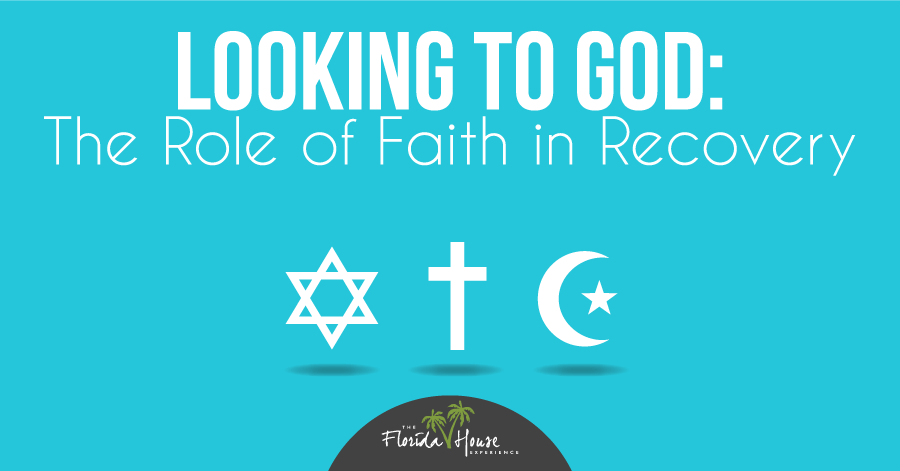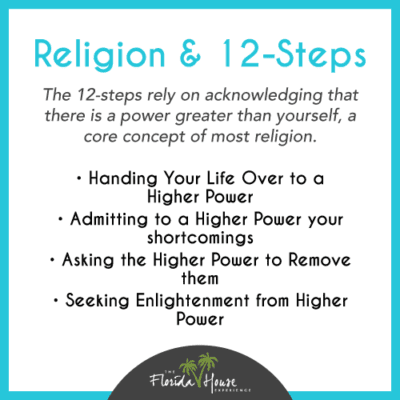
The 12-step treatment for drug and alcohol abuse recovery has long been considered a highly effective tool. It began as a component of Alcoholics Anonymous but has become a movement that is now used by many drug and alcohol rehab centers. A component of it is faith. Many men and women who come into a program like this rely on their faith to sustain their recovery efforts. Whether you have been spiritual before or not, you may want to embrace this component of the recovery process in your own way.
At FHE Health, we utilize the 12-step program as a component of your treatment. While faith is a part of that process, it’s not the only solution. During your treatment, individualized care is always the focus, which means you can choose how you embrace your journey forward. For many, faith and religion help sustain long-term recovery.
Is Faith a Part of the 12-Step Program?
 The 12 steps are defined by the original Alcoholics Anonymous program to include faith. At the heart of this program is faith that God is there to help. Step Two focuses on this, stating that individuals should believe that a higher power can help them. It doesn’t matter the form of that higher power; you can define what that is to you.
The 12 steps are defined by the original Alcoholics Anonymous program to include faith. At the heart of this program is faith that God is there to help. Step Two focuses on this, stating that individuals should believe that a higher power can help them. It doesn’t matter the form of that higher power; you can define what that is to you.
The 12-step program also focuses on:
- Deciding to hand over control over life to the higher power
- Admitting to the higher power (as well as yourself and others you have hurt) that you’ve made mistakes
- Asking the higher power to remove any shortcomings from your life
- Being ready to have a higher power correct those character flaws for you
- Being willing to make amends for those wrongs
- Seeking enlightenment as well as some type of connection with the higher power, such as through meditation or prayer
As you can see, the traditional version of AA and the 12-step program has a strong dependency on belief, faith and religion, though you are able to define what you believe in.
Why Does Religion Matter in Recovery?
 There are many reasons to put faith at the center of recovery. For men and women who are facing addiction, there is a strong sense of failure and even hate, toward themselves and the world around them. Addiction is the type of disease that thrives on isolation, even if you are surrounded by people each day. It can feel impossible to reach out to anyone who can help you.
There are many reasons to put faith at the center of recovery. For men and women who are facing addiction, there is a strong sense of failure and even hate, toward themselves and the world around them. Addiction is the type of disease that thrives on isolation, even if you are surrounded by people each day. It can feel impossible to reach out to anyone who can help you.
Because of this, having the ability and willingness to turn to a higher power can be not only freeing but empowering. While addiction strips everything from you, the one thing it cannot take away is a sense of religion and faith. Having that connection may be all you have, but it’s enough to help sustain you through the most difficult times of recovery.
People benefit from faith in many ways. Some people have a strong faith and religious practices in place before they begin using drugs and alcohol. Others find a new sense of freedom by having a higher power to turn to within their recovery. Take a look at some of the ways faith has helped others through the process.
A Sense of Purpose
Despair and a sense of worthlessness are common feelings in addiction. Faith can offer a sense of purpose again. Your life means more than just day-to-day struggles with money, relationships and drugs. Without this sense of purpose, you may be more likely to relapse.
In a study published in the U.S. National Library of Medicine, 25 patients entered into treatment programs with a spirituality focus. All of those patients reported that having a sense of faith aided in their recovery and relapse prevention efforts.
A Sense of Forgiveness
Sobriety brings with it guilt. Improving relationships will often require asking for forgiveness. Yet rebuilding relationships under these circumstances also creates a sense of defeat. Many people carry guilt for years after addiction as a result of being unable to forgive themselves.
Having the ability to seek forgiveness from a higher power can offer some help with this. It can aid in a person’s ability to let go of what they did, knowing they are forgiven if they seek that type of support.
A Sense of Encouragement and Support
For those who are battling addiction on their own, without family or friends to support them, religion offers that all-important support network. Having even this type of support can be an encouragement to remain on the path towards recovery. It’s humbling but also inspiring to know a higher power is working for your benefit.
How Can You Incorporate Faith into Your Recovery?
 When you enter drug and alcohol treatment, you’ll learn the 12-step program. You will also learn more about how faith plays a role in your day-to-day efforts to remain sober. Throughout your recovery, you can focus on your spirituality in a number of ways. This may include:
When you enter drug and alcohol treatment, you’ll learn the 12-step program. You will also learn more about how faith plays a role in your day-to-day efforts to remain sober. Throughout your recovery, you can focus on your spirituality in a number of ways. This may include:
- Through prayer, either those you create yourself or those you learn
- Meditation
- Remaining teachable and open to exploring your faith
- Reading religious books and tools
- Embracing spirituality efforts, such as groups and religious outings
- Sharing with others who share your faith; inspiring others to open up to faith
- Giving thanks daily for what you’ve achieved and overcome
Religion isn’t for everyone in its traditional form. However, both men and women find that having faith in a higher power is a tool to help them to focus on sobriety for the long term. It may be able to help you reduce some stress and handle higher levels of anxiety without the risk of drug or alcohol use.
Additionally, some find they have a stronger sense of optimism about their future. Others find that they have a strong social network they can rely on to support their recovery efforts. Faith doesn’t take the place of drug and alcohol treatment in a licensed facility. However, it can be an important part of your recovery effort as you move through such a program.
FHE Health Provides a 12-Step Treatment Plan to Help You
With the help of FHE Health, you can step away from the pain of addiction and enter into a 12-step program focused on improving your life. This is just one of the treatment options and components of your recovery journey. We encourage you to contact us to learn more about how treatment can change your life and your future.






